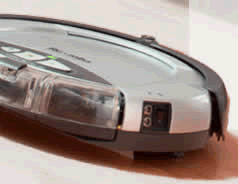Dear Mike,
I apologize for taking so long to respond. It's just that I decided
that this was too much fun and was taking too much time, so I decided
to go cold turkey. But I think the time has now come.
The question that you're addressing here has nothing to do with theOriginally Posted by Mike Alexander '59
intelligence of computers, but rather with the way that the computer
is packaged.
As I've previously mentioned, it's nice to think of intelligent
computers looking like either Arnold Schwarzenegger or Kristanna Loken
(or maybe Arianna Huffington after Terminator 4 comes out).
But I imagine that they'll look like computers or machines or
something.
From your reference to housekeeping, I assume that you're referring
to the Roomba:
As you indicate, the Roomba isn't very intelligent today, although
they've been coming out with new versions. The point is that these
devices will all become increasing intelligent as time goes on, and
by the 2020s, I believe you'll have intelligent devices that will do
the housework, fix the plumbing, make the bed, and do all sorts of
other things.
Here's another example, and this will give you an idea of what the
intelligent robot of the future might look like:
This device could have all sorts of arms and tools attached to it.
There could be various arms equipped with anything from screwdrivers
to guns. It could be integrated with some sort of rolling platform,
and so the device could indeed buss tables at a restaurant or do
hospital orderly work.
An interesting feature is the Vision and Targeting Head. Once computer
vision works a lot better, the robot device could actually have
multiple "eyes" attached to a number of "arms," and so could look
simulataneously in all directions, and around corners, and so forth.
In the diagram above, there's a computer in the upper left hand
corner. That's because the Packbot that you purchase today is, in
fact, controlled by this computer. By 2030, all the intelligence
will be packed into the robot itself.
So by the 2030, we'll have self-contained, autonomous,
super-intelligent computers able to do pretty much anything that a
human being could do.
John
John J. Xenakis
john@generationaldynamics.com
http://www.generationaldynamics.com
- Join Date
- May 2003
- Location
- Cambridge, MA
- Posts
- 4,010




